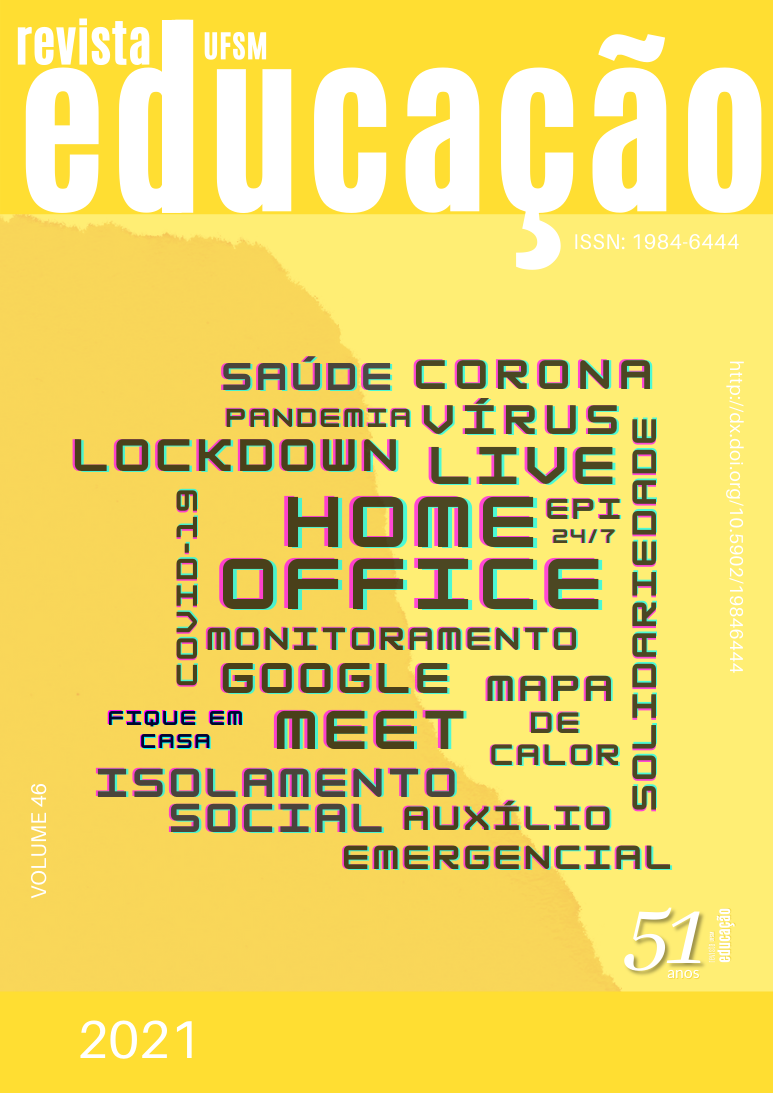Interfaces between professional education in alternation and omnilateral integrated education: reflections from the experience of the Escola Família Agrícola of Natalândia / MG [Agricultural Family School of Natalândia / MG] - EFAN
DOI:
https://doi.org/10.5902/1984644441651Keywords:
Alternation Pedagogy, Omnilateral Integrated Training, EFANAbstract
The present work has as its theme the reflection on the educational process of the Technical Course in Alternation of the Escola Família Agrícola de Natalândia-MG [Agricultural Family School of Natalândia / MG] - EFAN. The objective proposed here is to analyze the approximations between the Pedagogy of Alternation, conducted at EFAN, and the omnilateral integrated education. It is a work developed within the framework of qualitative research, using the case study as a technical procedure and free observation as an instrument of data collection. Also, documentary research, using as sources of data collection the Political-Pedagogical Project, the Educational Plan, the semi-structured interview directed to parents and teachers/monitors, and the focus group conducted with students from the Technical Course in Agriculture integrated with high school. As a result of this study, it is possible to perceive that there is, in the guidance documents of EFAN and about the educational process developed by it, a concern with developing critical-reflective thinking, as well as the creativity and curiosity of students with a view to integral education. Besides, it is possible to observe the establishment of a bond between general education and professional education that motivates students to take ownership of productive techniques and their respective scientific foundations. In this sense, it is observed that the educational way of EFAN dialogues with the perspective of omnilateral integrated education.References
ARAÚJO, Ronaldo Marcos de Lima; FRIGOTTO, Gaudêncio. Práticas pedagógicas e ensino integrado. Educação em Questão, Natal, v. 52, n. 38, p. 61-80, mai./ago. 2015. Disponível em: https://periodicos.ufrn.br/educacaoemquestao/article/view/7956. Acesso em: 04 nov. 2020.
BARBOSA, Sebastião Cláudio. A formação integrada omnilateral: fundamentos e práticas no Instituto Federal de Goiás a partir do Proeja. 2017. 202 f. (Tese de Doutorado) – Faculdade de Educação, Universidade Federal de Goiás, Goiânia, 2017.
BEGNAMI, João Batista. Formação pedagógica de monitores das escolas famílias agrícolas e alternâncias: um estudo intensivo dos processos formativos de cinco monitores. 2003. 319f. Dissertação (Mestrado Internacional em Ciências da Educação). Universidade Nova de Lisboa-Portugal - Universidade François Rabelais de Tours, França, 2003.
CERQUEIRA, Márcia Cristiana de Almeida; SANTOS, Célia Regina Batista dos. As Escolas Famílias Agrícolas, a Pedagogia da Alternância e o Caderno da Realidade. Disponível em http://coral.ufsm.br/sifedocregional/images/Anais/Eixo%2004/Marcia%20Cristina%20de%20A.%20Cerqueira%20e%20C%C3%A9lia%20Regina%20B.%20dos%20Santos.pdf. Acesso em: 15 maio 2019.
CIAVATTA, Maria. A formação integrada: a escola e o trabalho como lugares da memória e de identidade. In: FRIGOTTO, G.; CIAVATTA, M.; RAMOS, M. (Org.). Ensino Médio Integrado: concepções e contradições. São Paulo: Cortez, 2012. p. 83-106.
ESCOLA FAMÍLIA AGRÍCOLA DE NATALÂNDIA. Plano de Formação. 2015. Disponível em https://noticias.efanmg.com/documentos-importantes/. Acesso em: 10 set. 2018.
ESCOLA FAMÍLIA AGRÍCOLA DE NATALÂNDIA. Projeto Político-Pedagógico. 2018. Disponível em https://noticias.efanmg.com/documentos-importantes/. Acesso em: 10 set. 2018.
FRIGOTTO, Gaudêncio. Concepções mudanças no mundo do trabalho e o ensino médio. Disponível em: http://www.ia.ufrrj.br/ppgea/conteudo/conteudo-2008-2/Educacao-MII/2SF/2-Frigotto2008.pdf. Acesso em: 10 nov. 2020.
GIMONET, Jean-Claude. Praticar e compreender a Pedagogia da Alternância dos CEFFAs. Petrópolis: Vozes, 2007.
GRAMSCI, Antônio. Os intelectuais e a organização da cultura. Rio de Janeiro, Civilização Brasileira, 1995.
MANACORDA, Mario Alighiero. Marx e a pedagogia moderna. São Paulo: Alínea, 2007.
NASCIMENTO, Claudemiro Godoy. Pedagogia da resistência cultural: Um pensar a educação a partir da realidade campesina. In: Encontro Regional de Geografia (EREGEO), VIII, 2003, Cidade de Goiás. Anais.... Disponível em: http://www.geocities.ws/claugnas/pedagogiaresistencia.doc. Acesso em: 10 nov. 2020.
QUEIROZ, João Batista Pereira de. Educação rural no Brasil e EFAS: o processo de implantação da Escola Família Agrícola (EFA) de Goiás. 1997. Dissertação (Mestrado em Educação) - MEB- Faculdade de Educação, Universidade Federal de Goiás, Goiânia, 1997.
RAMOS, Marise Nogueira. Concepção do ensino médio integrado à formação profissional. Seminário sobre Ensino Médio, Superintendência de Ensino Médio da Secretaria de Educação do Estado do Rio Grande do Norte, Natal, agosto de 2007. (mimeo).
ROCHA, Isabel Xavier de Oliveira. A formação integral nos CEFFAs. Revista Formação por Alternância, Brasília, v. 1, p. 05-18, 2007.
SAVIANI, Demerval. O choque teórico da politecnia. Trabalho, Educação e Saúde, Rio de Janeiro, v. 1, n. 1, p. 131-152, Mar. 2003. Disponível em http://www.scielo.br/scielo.php?script=sci_arttext&pid=S1981-77462003000100010. Acesso em: 20 de mar. 2019.
SILVA, Lourdes Helena da. Experiências de formação de jovens do campo: alternância ou alternância? Viçosa: UFV, 2003.
SILVA, Lourdes Helena da. Educação Rural em Minas Gerais: origens, concepções e trajetória da pedagogia da alternância das EFA’s. Revista Educação em Perspectiva, Viçosa, v. 3, n. 1, p. 105-125, 2012.
Published
How to Cite
Issue
Section
License
Declaration of originality
We declare that all articles present in the journal Educação (UFSM) are originals and were not submitted for publishing on any other publication, as a whole or a fraction. We also declare that, after being published by Educação (UFSM), a paper will not be submitted to another journal within two years. After this time, our journal transfers the publishing rights to the authors, with a permit granted by the Editorial Council.
We also acknowledge that the originals’ submission to Educação (UFSM) implies on a transference of copyright for physical and digital publishing to the journal. In case of noncompliance, the violator will receive sanctions and penalties predicted by the Brazilian Copyright Protection Law (n. 9610, dated 19/02/98).
Attribution 4.0 International (CC BY 4.0)
This license lets others remix, transform, and build upon the material for any purpose, even commercially, and copy and redistribute the material in any medium or format.

This work is licensed under a Creative Commons Attribution 4.0 International (CC BY 4.0)






